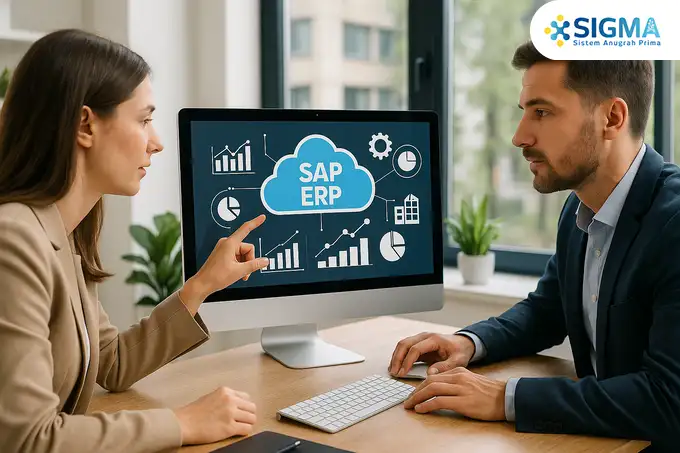SAP Cloud ERP is a cloud-based Enterprise Resource Planning system, meticulously designed to integrate and automate a company’s core business processes within a single, centralized platform.
Amidst an era of sweeping digital transformation—where speed, flexibility, and remote collaboration have become the new standard—the importance of having a reliable business infrastructure has never been more critical.
Companies can no longer depend on rigid, isolated systems. They require solutions that can swiftly adapt to market changes, be accessible from anywhere, and deliver real-time insights for strategic decision-making.
This topic has gained profound relevance, as cloud adoption is now a cornerstone of modern business modernization strategies. SAP, as a global leader in enterprise software, delivers cloud ERP solutions that blend deep functionality with the unmatched advantages of cloud technology.
In this comprehensive article, you will gain a full understanding of SAP Cloud ERP: its core definition, transformative benefits, key features, advanced data security, in-depth comparisons with traditional on-premise models, pricing structures, and step-by-step migration guidance.
Let us delve deeper into why SAP Cloud ERP is a strategic investment for the future of your enterprise.
What is SAP Cloud ERP?
In essence, SAP Cloud ERP is SAP’s suite of enterprise resource planning applications, hosted and managed by a cloud service provider (either SAP itself or a certified partner), and accessed securely via the internet.
It represents a fundamental shift from the traditional on-premise model, where companies were required to purchase, install, and maintain physical servers and infrastructure on their own premises.
The cloud ERP paradigm empowers companies to concentrate on their core business operations, while the technical complexities—such as server maintenance, patching, and system upgrades—are managed by the service provider.
Key Components of SAP Cloud ERP
This system comprises a broad range of integrated modules that encompass nearly every operational aspect of an enterprise, underpinned by a powerful platform that ensures performance and scalability.
These modules operate in unison, delivering a holistic, 360-degree perspective of the business.
Popular Variants of SAP Cloud ERP
SAP offers several variants of its cloud ERP solutions, tailored to match the scale and complexity of different businesses:
- SAP S/4HANA Cloud: The most advanced and intelligent ERP solution from SAP, designed for medium to large enterprises. Built upon the in-memory SAP HANA database, it delivers real-time analytics, AI-driven intelligent automation, and a sleek, user-friendly interface (SAP Fiori).
- SAP Business ByDesign: A fully integrated and comprehensive ERP cloud suite, created specifically for the fast-growing small and medium enterprise (SME) market. It provides end-to-end functionality—finance, HR, sales, procurement, and supply chain management—in one package.
- SAP Business One Cloud: A widely popular ERP solution for SMEs, now available in the cloud. SAP Business One Cloud delivers flexibility and scalability, enabling smaller enterprises to access robust ERP capabilities without heavy infrastructure investments.
Architecture and Deployment Models
SAP Cloud ERP is typically offered in two deployment models:
- Multi-tenant: Multiple customers (tenants) share the same infrastructure and applications, yet their data is fully isolated and secured. This model is more cost-efficient and receives updates more rapidly.
- Single-tenant: Each customer has dedicated infrastructure and applications. This model offers greater customization flexibility, resembling the on-premise experience, while still harnessing the advantages of the cloud.
Key Benefits of SAP Cloud ERP for Business

Adopting SAP Cloud ERP is not merely about moving systems online. It is a strategic decision that unlocks a wealth of transformational benefits, often unattainable through traditional on-premise solutions.
1. Limitless Scalability
Growing enterprises demand systems that expand alongside them. With SAP Cloud, you can seamlessly scale users, modules, or computing resources in alignment with evolving needs.
This can be accomplished swiftly without investing in additional hardware, granting businesses remarkable agility in seizing market opportunities.
2. Reduced Operational Costs and Total Cost of Ownership (TCO)
Traditional on-premise models require heavy upfront investments (Capital Expenditure / CapEx) for servers, software licenses, and specialized IT staff.
In contrast, SAP Cloud pricing follows a subscription-based model (Operational Expenditure / OpEx), eliminating massive upfront CapEx and transforming it into predictable monthly or annual operating costs.
Over time, the TCO is significantly reduced, as businesses are spared the expenses of electricity, server cooling, hardware maintenance, and system upgrades.
3. Flexible Access, Mobility, and Remote Work Support
In today’s work environment, the ability to access data and manage business processes from anywhere is essential.
SAP Cloud ERP is accessible through web browsers or mobile apps on any internet-enabled device. This empowers teams to remain productive—whether in the office, at home, or on the move.
4. Automatic Updates and Continuous Innovation
With the cloud model, SAP regularly delivers updates, security patches, and cutting-edge innovations. These are applied automatically by the provider, ensuring that your system remains state-of-the-art without straining internal IT resources.
Businesses automatically benefit from the latest technologies, including AI, machine learning, and predictive analytics.
5. Superior Integration and Interoperability
Modern systems must seamlessly connect with a broader ecosystem of applications. SAP Cloud ERP is designed with open APIs, simplifying integration with other cloud services, e-commerce platforms, CRM systems, or third-party applications. This fosters a cohesive and efficient digital ecosystem.
Core Features and Functions of SAP Cloud ERP

The true strength of SAP Cloud ERP lies in its extensive and deeply integrated functionalities, purposefully crafted to optimize every department across the enterprise.
Comprehensive Core Modules:
- Finance: Manage general ledger, accounts receivable, accounts payable, cash management, financial reporting, and regulatory compliance in real-time.
- Supply Chain Management: Streamline processes ranging from raw material procurement and inventory management to the distribution of finished goods.
- Inventory Management: Gain complete visibility into stock levels across multiple locations, automate reordering, and minimize storage costs.
- Production Planning: Oversee and control the entire production cycle—from material requests to finished products—ensuring efficiency and quality.
- Human Resources: Manage employee data, payroll, recruitment, and talent development seamlessly.
- Analytics and Reporting: Provide interactive dashboards and in-depth reports, accessible in real-time, to empower data-driven decision-making.
Intelligent Technology-Driven Features:
- Real-Time Reporting: With in-memory databases like SAP HANA, reports can be generated within seconds rather than hours or days.
- Interactive Dashboards: Clear and intuitive data visualizations allow managers to quickly monitor Key Performance Indicators (KPIs).
- AI & Predictive Insights: Embedded machine learning capabilities predict customer demand, detect potential fraud, and recommend process optimizations.
- Process Automation: Automate repetitive manual tasks, such as approvals or financial reconciliations, to boost efficiency and reduce human error.
Security, Compliance, and Reliability
One of the foremost concerns when transitioning to the cloud is data security. SAP and its partners address this through immense investment in building a platform that is secure, compliant, and resilient.
Multi-Layered Data Protection:
- Encryption: Your data is encrypted both in transit (across the internet) and at rest (on servers), shielding it from unauthorized access.
- Data Isolation: In multi-tenant environments, each client’s data is logically segregated to prevent cross-tenant breaches.
- Backup & Disaster Recovery: Data is routinely backed up across multiple geographic locations, ensuring business continuity in the event of localized outages.
Certifications and Regulatory Compliance:
SAP Cloud platforms adhere to international security and compliance standards such as ISO 27001, SOC 1, and SOC 2.
Moreover, SAP ensures adherence to global data privacy laws such as the GDPR in Europe—often considered a worldwide benchmark. In Indonesia, trusted local partners ensure alignment with relevant domestic regulations.
Uptime, SLA, and Reliability:
SAP Cloud providers offer Service Level Agreements (SLAs) guaranteeing exceptionally high system availability—frequently 99.9% or higher. This dramatically reduces the risk of disruptive downtime compared to managing servers independently.
SAP Cloud ERP vs. On-Premise ERP: Which is Right for You?
Choosing between cloud and on-premise models is a strategic decision. The SAP Cloud vs. On-Premise debate is common, and grasping the distinctions is essential. The following table summarizes the key differences:
| Aspect | SAP Cloud ERP | SAP On-Premise ERP |
|---|---|---|
| Initial Costs | Low (subscription model, OpEx) | Very High (server purchase, licenses, CapEx) |
| Ongoing Costs | Predictable (fixed subscription fees) | Unpredictable (maintenance, upgrades, utilities) |
| Scalability | Highly Simple & Fast | Difficult & Time-Consuming (requires new hardware) |
| Flexibility & Access | High (accessible from anywhere via the internet) | Limited (typically restricted to internal networks) |
| Maintenance & Upgrades | Managed by the provider | Fully handled by internal IT teams |
| IT Infrastructure & Staffing | Minimal requirements | Requires a large, specialized IT team |
| Security & Control | Security managed by experts, shared control | Full control over data & physical infrastructure |
| Innovation & New Features | Automatic and continuous updates | Manual and infrequent updates |
In general, SAP Cloud ERP is the ideal choice for businesses prioritizing agility, cost efficiency, scalability, and a focus on core growth—free from the burdens of complex IT management.
SAP Cloud ERP Pricing & Cost Models

One of the most frequently asked questions is: “How much does SAP Cloud cost?” The answer varies, as the pricing model is inherently flexible.
Subscription Model:
The core cost is typically calculated per user, on a monthly or annual basis. Pricing often scales depending on user type—for instance, full-access professional users versus limited-access logistics users.
Additional Costs to Consider:
- Implementation: Fees for consulting, initial configuration, and aligning the system with your unique business processes.
- Training: Costs for equipping your team to fully leverage the new system’s capabilities.
- Customization & Integration: Should you require tailored functionalities or integration with other systems, development costs may apply.
Tips for Cost Estimation:
For small and medium enterprises, the most effective way to obtain accurate estimates is by consulting a trusted SAP Cloud partner in Indonesia.
They will analyze your specific requirements, recommend the most suitable solution (e.g., SAP Business One Cloud or Business ByDesign), and provide transparent cost details.
The Migration Process to SAP Cloud ERP
Migrating to SAP Cloud ERP is a strategic endeavor that demands meticulous planning.
When is the Right Time to Migrate?
- When your legacy ERP system is outdated and no longer supports business growth.
- When the maintenance costs of on-premise systems become excessive.
- When your company requires greater flexibility and collaboration to support hybrid or remote work models.
- When you wish to harness the latest technologies such as AI and advanced analytics.
Key Stages of Migration:
- Assessment: Analyze existing systems, business processes, and data quality.
- Planning: Define the project scope, timeline, budget, and select the right implementation partner.
- Data Mapping & Migration: Cleanse and map legacy data into SAP Cloud ERP structures.
- Testing: Perform comprehensive testing to ensure accurate data transfer and full system functionality.
- Go-Live: Deploy the new system across the organization.
- Post Go-Live Support: Secure partner support to guarantee a smooth transition.
Migration Best Practices:
- Engage all stakeholders from the very beginning.
- Prioritize change management and user training.
- Never underestimate the importance of data cleansing.
- Collaborate with an experienced implementation partner.
Selecting the Right SAP Cloud ERP Partner and Vendor

The success of your ERP implementation hinges heavily on the partner you choose.
Ideal Partner Criteria:
- Official SAP Certification: Ensure the partner is formally recognized by SAP.
- Industry Experience: Choose a partner with in-depth understanding of your specific sector.
- References and Case Studies: Request evidence of successful past implementations.
- Local Support: A partner with a local Indonesian presence will better understand business dynamics and regulations while offering more responsive support.
The Importance of Local Expertise:
Local partners such as PT. Sistem Anugrah Prima (SIGMA) provide not only technical implementation but also strategic consultation tailored to Indonesia’s unique market.
They understand challenges around tax compliance, labor regulations, and local business practices—advantages that are invaluable for long-term success.
FAQ – Frequently Asked Questions
Is SAP Cloud ERP suitable for all businesses?
Nearly all organizations—from small and medium enterprises to large-scale corporations—can reap the benefits of SAP Cloud ERP. The key is choosing the most appropriate variant, such as SAP Business One Cloud for SMEs or S/4HANA Cloud for large enterprises, tailored to your needs and budget.
Can SAP Cloud ERP be customized?
Yes. SAP Cloud ERP can be customized and its functionality expanded through add-ons or specialized development. That said, the best approach is to leverage SAP’s built-in industry-standard processes to ensure optimal efficiency.
What about data ownership and backups?
You remain the sole owner of your data. Cloud service providers conduct regular backups according to SLA agreements, safeguarding your information and ensuring recoverability.
How long does migration typically take?
The migration duration depends on business complexity, data volume, and customization levels. For SMEs, the process may take only a few months, whereas large corporations may require extended timelines.
How does cloud security and compliance compare to on-premise?
In many cases, cloud environments deliver superior security. Providers such as SAP employ global security experts operating around the clock, utilizing state-of-the-art technologies—levels of protection often beyond the capacity of most internal IT teams.
Conclusion & Next Steps
SAP Cloud ERP is no longer merely an option; it has become a strategic imperative for organizations striving to remain competitive, agile, and relevant in the digital era.
By offering limitless scalability, cost efficiency through lower TCO, flexible access, continuous innovation, and world-class security, SAP Cloud ERP empowers businesses to focus on what matters most: growth and customer satisfaction.
The comparison between SAP Cloud and on-premise solutions clearly reveals that the future lies in the cloud. It provides a solid foundation for building intelligent, integrated enterprises ready to confront tomorrow’s challenges.
Do not delay your digital transformation. The first step is understanding how SAP Cloud ERP can be precisely tailored to your company’s unique needs.
Embark on Your Digital Transformation Journey Today!
Are you ready to elevate your business with the efficiency, flexibility, and security of SAP Cloud ERP?
Our experts at PT. Sistem Anugrah Prima (SIGMA), an official SAP partner in Indonesia, are here to guide you. With years of experience across diverse industries, we help organizations succeed in implementing SAP solutions.
Contact us today to receive:
- Free Consultation: Discuss your business challenges with our expert consultants.
- Request a Demo: Experience firsthand how SAP Cloud ERP can optimize your operations.
- Transparent Cost Estimates: Obtain a proposal customized to your business scale and needs.
Get in touch with PT. Sistem Anugrah Prima (SIGMA) for your Free SAP Cloud ERP Demo!
Why Choose SAP Cloud ERP with PT. Sistem Anugrah Prima (SIGMA)?
Digital transformation is not merely about adopting new technology—it is about creating a future-ready enterprise. With SAP Cloud ERP, your business gains the power to scale, adapt, and thrive in a competitive landscape. Yet, the choice of implementation partner is equally critical in ensuring success.
Our Distinct Advantages:
- Official SAP Gold Partner: Certified recognition that guarantees expertise, credibility, and alignment with SAP’s global standards.
- Deep Industry Insight: Our consultants bring decades of experience across multiple industries, ensuring that solutions are not only technically sound but also business-driven.
- Local Presence, Global Standards: Based in Indonesia, SIGMA combines intimate knowledge of local regulations, taxation, and market dynamics with SAP’s world-class methodologies.
- Comprehensive End-to-End Services: From consultation, implementation, and training to ongoing support, we deliver holistic services that ensure sustainable success.
Our Commitment:
At PT. Sistem Anugrah Prima (SIGMA), we believe in building lasting partnerships with our clients. We don’t just implement technology—we align it with your long-term vision, helping your business evolve into an intelligent enterprise that is agile, secure, and future-ready.
Take the Next Step Towards Cloud Excellence
The future of ERP is in the cloud, and the time to act is now. With SAP Cloud ERP and SIGMA as your trusted partner, your organization is poised to achieve new heights of efficiency, innovation, and growth.
- Transform your operations with cutting-edge cloud technology.
- Empower decision-making with real-time insights.
- Reduce IT complexity and focus on core business growth.
- Gain peace of mind with world-class security and compliance.
Start your journey today. The digital economy rewards those who move swiftly and decisively. Don’t let outdated systems hold you back—embrace the cloud and unlock the full potential of your enterprise.
🚀 Contact PT. Sistem Anugrah Prima (SIGMA) Now and Begin Your SAP Cloud ERP Transformation!

